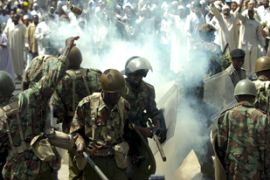Kenya opposition to resume protests
Move comes after AU mediation fails to resolve political and humanitarian crisis.

Published On 11 Jan 2008
Salim Lone, a spokesman for Odinga’s Orange Democratic Movement, on Friday said: “We have recognised that the government is not interested in any mediated resolution to the crisis in our country.
“We therefore resume with immediate effect our nationwide mass action and rallies that we had postponed.”
Failed mediation
John Kufuor, chairman of the African Union and president of Ghana, left Nairobi on Thursday night after two days of mediation failed to persuade Kibaki and Odinga even to meet each other.
| Your Views |
|
Mabraham, Toronto, Cananda |
Odinga says Kibaki robbed him of victory in the presidential poll by rigging the vote count and has refused to recognise his re-election.
Kofi Annan, the former UN secretary-general, has agreed to take over mediation efforts but is not expected to arrive in Nairobi before Tuesday, his office in Geneva said.
The unrest has tarnished Kenya’s democratic credentials, damaged east Africa’s largest and previously booming economy, hit supplies to neighbours, and unnerved Western donors.
An opposition source said ODM leaders would march to a Nairobi police station later on Friday, after a news conference, to give notice of plans for nationwide demonstrations starting on Wednesday.
“We are going to go through a very dark period in this country’s history,” he said.
Analysts say Odinga has, however, lost momentum in recent days as Kibaki entrenches himself by appointing half a cabinet, carrying out state functions, and recalling parliament.
Aides for the 76-year-old president, a veteran of Kenyan politics and member of the nation’s largest and most powerful Kikuyu tribe, say the opposition’s refusal to meet Kibaki face-to-face shows it is not interested in dialogue.
Kibaki and Odinga, a 63-year-old former political prisoner and wealthy businessman, have not met since the vote, even though they have had close ties in the past including when the opposition leader sat in Kibaki’s cabinet from 2002-2005.
Poor affected
Around Kenya, there is widespread frustration that the poor have largely paid the price of the unrest while the political elite have stayed in comfortable and well-guarded compounds.
| Related | ||||||
|
As well as the death toll, which aid groups say will rise to well over 500 and Odinga claims is already nearing 1,000, more than a quarter million Kenyans have been displaced by the post-election violence.
Aid groups have warned of a potential health emergency in makeshift camps in schools, hospitals and churches in the Rift Valley region of western Kenya, as well as Nairobi’s slums.
The West, including the United States and Britain, Kenya’s former colonial ruler, has expressed displeasure at irregularities in the presidential vote count, and is pressing for some sort of power-sharing agreement.
Kibaki has said he will consider a unity government, while Odinga would prefer a re-run of the election.
With key sectors like tourism and commodities affected by the crisis, analysts say the full impact on one of Africa’s brightest economies depends wholly on how long it lasts.
Razia Kahn, an analyst for Standard Chartered bank, said: “Sentiment is likely to benefit from any resolution to the current impasse, although it is highly unlikely that confidence will bounce back to pre-election levels.”
Source: News Agencies


